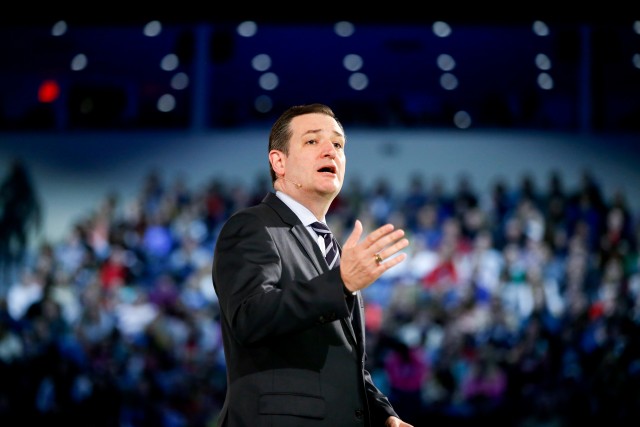
Associated Press
By Philip Elloitt
Associated Press
LYNCHBURG, Va. — Launching his bid for the Republican presidential nomination, Sen. Ted Cruz of Texas asked Christian conservative voters to imagine a United States without the IRS, Obamacare or abortion rights — and to imagine they can make that happen by supporting him.
His aspirational appeal on Monday, aimed at America’s most conservative voters, could quickly run into challenges in winning over moderate voters — and eventually deep difficulties in governing should Cruz win the White House.
But it’s a message that Cruz, the first major 2016 contender to declare himself a candidate, is expected to forcefully emphasize in the coming year before voters start to pick nominees.
“God’s blessing has been on America from the very beginning of this nation, and I believe that God isn’t done with Americans,” Cruz declared at Liberty University, a Christian school founded by the late Rev. Jerry Falwell.
“I believe in you. I believe in the power of millions of courageous conservatives rising up to reignite the promise of America. And that is that is why, today, I am announcing that I am running for president of the United States of America.”
Cruz won’t be the sole GOP contender for long. Two Senate colleagues, Kentucky’s Rand Paul and Florida’s Marco Rubio, are eyeing campaign launches soon. And former Florida Gov. Jeb Bush, Wisconsin Gov. Scott Walker and New Jersey Gov. Chris Christie, are expected to follow, among others.
The 44-year-old Cruz is betting his White House hopes on profoundly conservative voters and their opposition to policies they find abhorrent.
Within such circles, there is deep distrust of the IRS, which was revealed last year to have been scrutinizing tea party groups’ nonprofit status.
Scuttling President Barack Obama’s health care legislation, called by some “Obamacare,” is a rallying cry, as well. And abortion is a major issue for Christian conservatives who have tremendous sway in the lead-off caucus and primary election states of Iowa and South Carolina.
During his 30-minute kickoff speech, delivered like a sermon without notes or cue cards, Cruz made clear he sees electoral potential in his unbending advocacy.
“Today, roughly half of born-again Christians aren’t voting — they’re staying home,” Cruz said. “Imagine, instead, millions of people of faith all across America coming out to the polls and voting our values.”
Following his election to the Senate in 2012, the former Texas solicitor general quickly established himself as an uncompromising figure willing to take on Democrats and sometimes Republicans, too. Divisive within his own GOP, he won praise from tea party activists for leading the effort to shut the federal government during an unsuccessful bid to block money for the health law.
He spoke on the fifth anniversary of that law — legislation that prompted Cruz to stand for more than 21 hours in the Senate to denounce it in a speech that delighted his supporters and other Obamacare foes.
Cheers rose Monday in the hall when Cruz reminded the crowd that Liberty University filed a suit against the law right after its enactment.
But the partial government shutdown was not widely popular, and Democrats signaled that it would be central to their criticism of the first-term senator.
“His reckless approach to governing would make life worse, not better, for Americans and he isn’t the type of fighter that America’s middle-class families need,” Democratic National Committee chair Debbie Wasserman Schultz said in a statement.
The son of an American mother and Cuban-born father, Cruz would be the first Hispanic president.
To the enthusiastic crowd, he urged students to “imagine a president that finally, finally, finally secures the borders.”
He also nodded to the tea party, which emphasizes limited federal spending and a libertarian-leaning view of government.
“Imagine a simple flat tax,” he said. “Imagine abolishing the IRS.”
He left unexplained how the government would collect taxes without the Internal Revenue Service. The flat tax has never gone anywhere in Congress because the only way it can work is either by dramatically cutting spending or significantly increasing taxes for most low- and middle-income families. Now, wealthy families in general pay federal income taxes at higher rates than the rest of the population.
On abortion, Cruz said: “Imagine a federal government that works to defend the sanctity of human life.”
By announcing a candidacy that has long been obvious, Cruz triggers accounting and reporting requirements for the money he is raising and spending. To help build his campaign account, he is heading this week to donor-heavy New York.
For his announcement, Cruz bypassed Texas, which he represents in the Senate, as well as early nominating states such as New Hampshire, where Mitt Romney kicked off his campaign for the GOP nomination in 2012, and Iowa.
By getting in early — in a late-night message on Twitter and then his kickoff speech — Cruz was hoping to claim ownership of the influential corner of the Republican Party for whom cultural issues are supreme. It was a move at crowding out figures such as former Arkansas Gov. Mike Huckabee, a former Baptist pastor, and former Sen. Rick Santorum, who has made his Catholic faith a cornerstone of his political identity.


